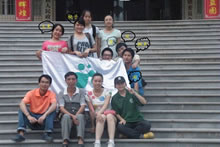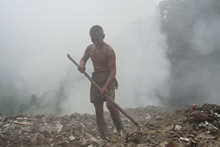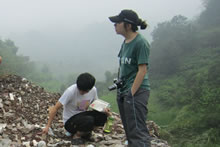
By Wei Luodong (Project Officer, Eco-health project in Gong County of Sichuan)
Information source: Organic Reunion[1]
PCD believes that for human beings to become truly healthy, we have to take care of the health of the environment, the land and the community at the same time because they are related and cannot be separated. In attaining sustainable development we gain ‘holistic health’. At the end of July, PCD and GreenSOS[2] of Sichuan organised a field study in Xiao Er Township in Gong County, Yibin, Sichuan. Students and volunteers from eight universities (among whom three were local residents) took part in the field study, which lasted for ten days. During the field study, they explored changes in the everyday life of local people in the context of rapid urbanisation, such as the implementation of garbage sorting and the adoption of urban consumption pattern and how residents were affected in their thinking. The participants also reflected on the outcome of the study and gave their own feedback.
Like many townships and communities undergoing wholesale urbanisation, Xiao Er Township is faced with the problems of contamination of water sources, rapid increase of garbage and destruction of the natural environment. Wholesale urbanisation has also had an impact on local traditional culture. Participants talked directly to the local people, such as an old lady who sighed at the fact she could no longer use the water of Nanguang River to cook rice, a technician who talked about how consumerism resulted in fewer people bringing their home electrical appliances to him for repair… Though what the participants collected were only words spoken in lanes and on the streets, when we looked up at the sky made grey and murky by the power plant, or put our feet on the garbage hill whose depth seemed unfathomable… these ordinary words struck like thunder in the heads of the students.
Words that flow from the hearts of Xiao Er Township residents
Let us listen to the words of Xiao Er Township Residents collected by the students:
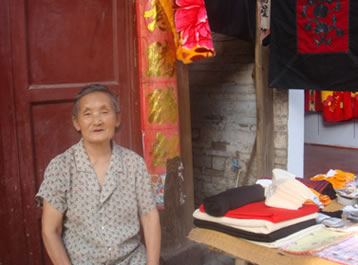 |
Grandma Zhou is an old-timer of Xiao Er Township. She misses the old days when she carried water from Nanguang River to cook rice and she misses her old house which was cool, even in summer. The water that comes from the tap is convenient but not clean, she said. She has all sorts of home electrical appliances but rarely uses them. Her children and grandchildren bought them for her. |
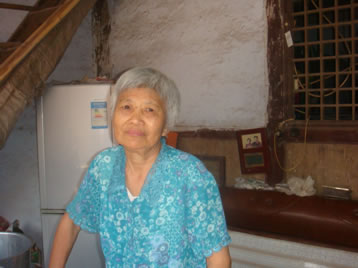 |
Grandma Yuan used to work in a supply-and-marketing cooperative. As she recalls the old times, not only does she feel things are much more expensive now, she also misses the old days when there was no garbage on the street. In the old days when you bought something, it was only wrapped in paper, contained in a jar or carried in handkerchiefs, she says. |
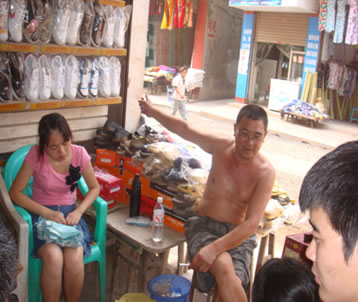 |
The volunteer team leader (centre) has been the unpaid director of the Residents’ Committee for 14 years. He became a volunteer because of garbage sorting and was later elected captain because he was hardworking and responsible. When he describes his work he is obviously proud of himself. When he reminisces on the former beauty of the landscape of Xiao Er and talks about the pollution nowadays, he cannot hold back the distress he feels. |
More Xiao Er residents express their true feelings…
“Since I moved from the village to the town, life seems to be more tiring than before. I grew vegetables and raised pigs… how I miss the evenings when everyone sat beneath the trees and chatted…”
“We used to get and drink water directly from the Wansaixi River, which was right in front of our house. Now the water is so dirty. Even the water that comes from the water plant is muddy and yellowish…”
“Before, there was no garbage on the street. Everything was used. When we went to buy salt, we took a jar with us. When we bought sweets, paper was used to wrap them. When we went to shop for cloth, we would carry a cloth bag. There were no plastic bags at all and there was not so much white-coloured garbage.”
“It was five years ago that we started to use throw-away boxes and bags for customers to take away the leftover food.”
“Now there are only the two of us at home and we are old. Our children are away from home and we actually have no need of a refrigerator or colour TV, but our children and our grandchildren said they had to show their piety and so they bought them for us…”
“Companies are too quick to offer new models of home electrical appliances. Nowadays everyone has money. Very few people bring their appliances to me for repair. They’d rather buy a new one…”
To have had someone make the choice for you and to make the choice yourself
The ten days in Xiao Er were very sunny. Going through streets and lanes visiting rural villages and villagers, witnessing the rapid development of the small town as well as the highly mobile population and accelerating commercialisation, Zhang Yanan sighed: “For a small town, it’s hard to call people’s attention to the issue of environmental protection and sustainability, because they’re already used to the ‘convenience’ and ‘prosperity’ brought by the economic development taking place all over the country.”
Chen Mengdi, a university student from Xiao Er, asked why there was a need to have a few waste separation bins at home and thought it was troublesome to do so… but Wu Yi of Southwest Petroleum University described this as a state of “having had someone make the choice for you or having to make the choice yourself.” To have someone make the choice for you means the ordinary people did not have a say when the power plant was built. It has brought economic development, information is more and more commercialised and people’s material lives are richer, but as choices grow, people’s desire also grows. When the policy of garbage sorting was launched, it was also a matter of having someone make the choice for you. People had not wanted to do it of their own accord; it was an order from the government. People only discovered the meaning of garbage sorting in the process, when they gained the opportunity to reflect on the kind of life they wanted to live. “Having a choice” means that when something happens we do not have a choice about, we have the space to choose to create something else: we can refuse to be controlled by the consumption pattern designed by others or by commercial interests. We cannot change the mainstream economic development model, but we can reflect: in material terms, how much is enough? Where do we gain our sense of happiness? What form of consumption and what kind of life shall we choose…?
Examining life anew
Reflecting on the visits and discussions in these ten days university student Wen Huiling, who was also from Xiao Er, felt she had gained a deeper understanding of the meaning of the harmonious coexistence of human beings and the environment. Chen Mengdi also felt that environmental protection and our everyday lives were closely related. As someone coming from Xiao Er, he was happy he had taken part in this activity and would like more opportunities to take part in activities that would help him understand his home town and enable him to re-examine his life…
On the last part of the field study, the participants organised a summer night party on their own initiative and invited members of the community to take part. In this way, from being individuals they went on to work as a team, and from being unfamiliar about the status quo and feeling helpless, they went on to reflect and explore new possibilities… Perhaps the ten-day survey and study programme at Xiao Er would serve only as a seed for their team; perhaps more youths from the community would join in; perhaps they, who are all studying in Chengdu, would form a new young people’s network; perhaps many of them are looking for such a platform and an interaction…
1. Organic Reunion was organized by students taking part in the 10-day field study in Xiao Er Township, Gong County in Yibin, Sichuan. Members include: Zhang Yanang (Second-year student in Environment Science at Southwest University for Nationalities), Hu Min (Third-year student of Sichuan University), Wu Yi (First-year student in Legal Studies at Southwest Petroleum University), Luo Ziping (Civil Engineering at Jinjiang College), Zhang Tao (Animal Science at Southwest University for Nationalities), Tang Hao (Acupuncture and Massage at Chengdu University of Traditional Chinese Medicine), and three local persons, namely Wen Huiling (Computers at University of Electronic Science and Technology of China), Chen Mengdi (Finance at Jincheng College), and Chen Qing (volunteer).
2. GreenSOS is the acronym of the Green Students Organizations Society. It aims to serve student environmental groups in western China and to arouse young people to pursue their green mission. Since its establishment in 2001, GreenSOS has been targeting university environmental groups in western China (especially in Sichuan) to realise the organic interaction in the chain of “GreenSOS—Projects—Students Societies—Volunteers,” by means of an operational mode of “exchange + platforms + projects + training + volunteers”. By enhancing the level of integrated management of students’ environmental groups, GreenSOS aims to develop the capability of university students to analyse and deal with environmental problems, so as to strengthen the student force for environmental protection and to garner green talent for the sustainable development of China.


